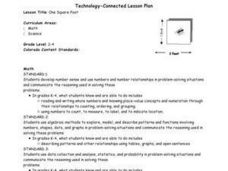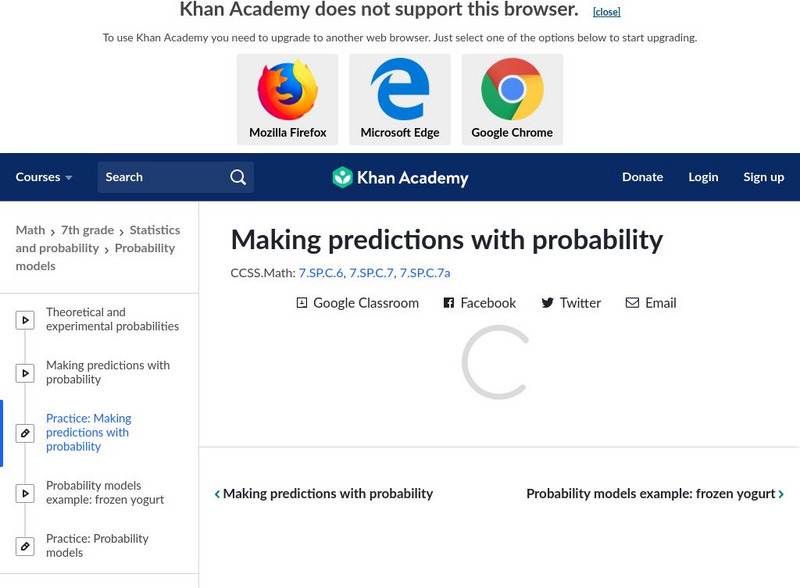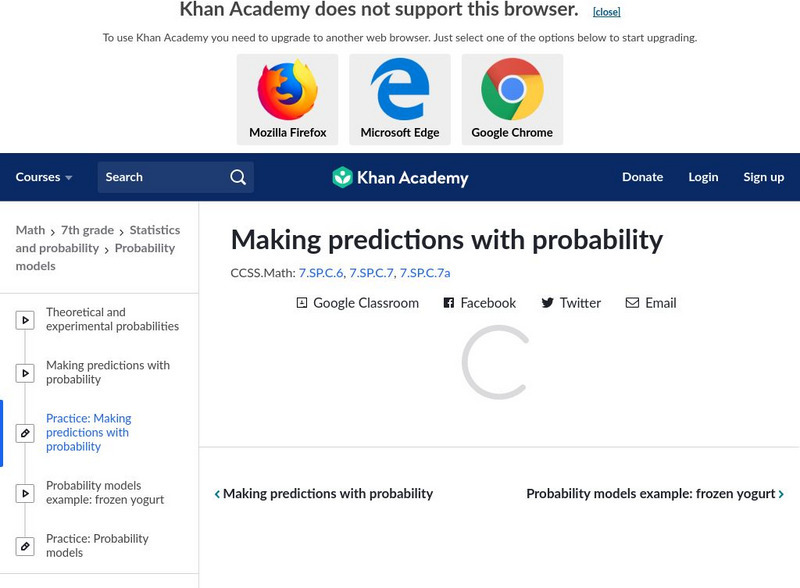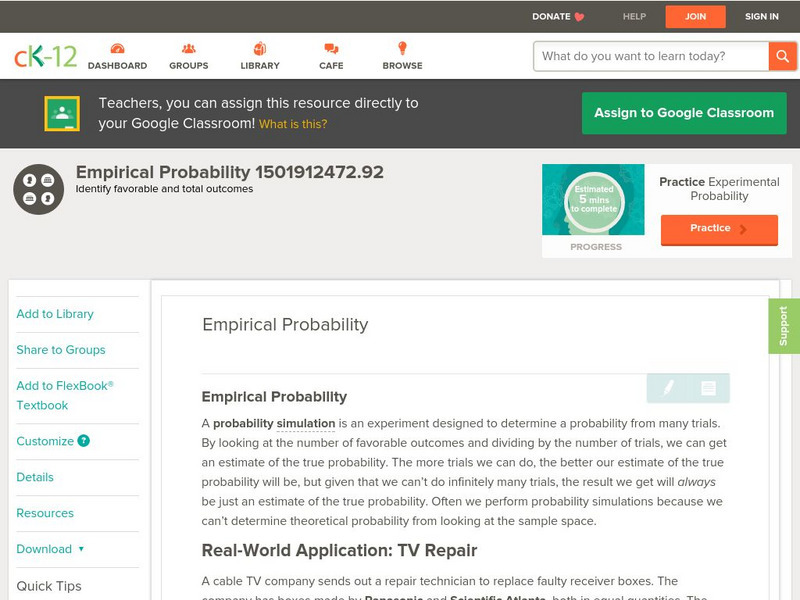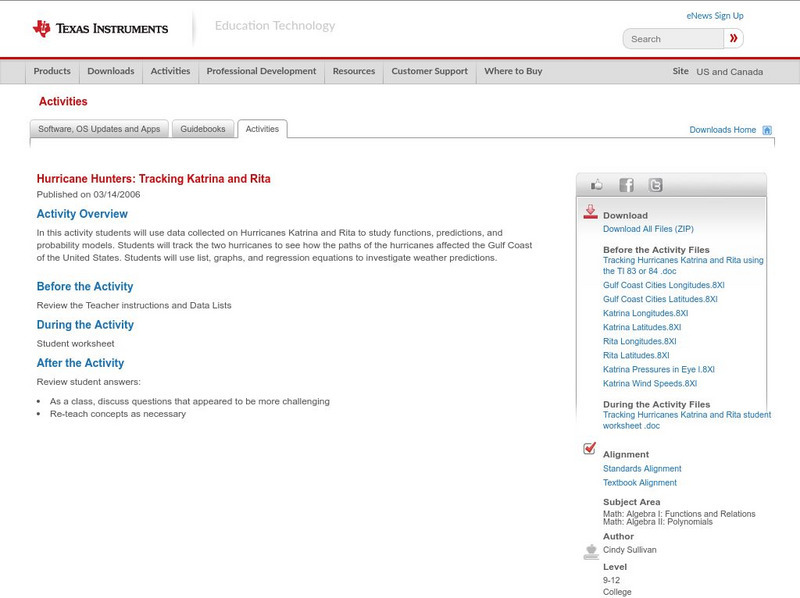Curated OER
Is It Likely or Is It Unlikely?
n a class discussion Students identify events or situations as being likely to occur or unlikely to occur. Then, they work in pairs to generate likely and unlikely statements to share with the class.
Curated OER
An Apple A Day
Students create a graph that showcases their pick for favorite kind of apple. Students are given samples of a variety of apples to determine their favorite in a taste test. They a create a tally chart of favorite kinds apples and use a...
Curated OER
Creating The Virtual Model
Students engage in a lesson that is about the concept of earthquake design. The lesson includes the integration of technology and how it can be used to create buildings and structures for withstanding an earthquake. Students also define...
Curated OER
Introduction to Scatter Plots and Correlation
High schoolers examine the concept of scatter plots. They compare baseball statistics to locate the ones that correlate with winning, and identify the positive, negative, and no correlation in sets of data using MS Excel.
Curated OER
Natural Selection
Students practice calculating allele and genotype frequencies in the framework of a simple simulation using hard candy, calculators, and a worksheet. This lesson includes a three-page worksheet and an assessment question for conclusion.
Curated OER
One Square Foot
Young scholars identify, describe, count, tally, and graph life found in one square foot of land.
Curated OER
Cosmic Collisions and Risk Assessment
In groups, learners create their own scientific impact experiments using ordinary materials, and observe and measure results with a variety of impacting bodies and velocities.
Curated OER
Feedback and Flowcharts
Sixth graders explain what a negative feedback system is and they distinguish it from a positive feedback system. They describe examples of how negative feedback is used in both nature and technology. , Students define homeostasis, and...
Khan Academy
Khan Academy: Making Predictions With Probability
Practice making predictions with probability with these problems.
Beacon Learning Center
Beacon Learning Center: Who Will Probably Come to the Party?
Students use tree diagrams to find possible outcomes and make predictions for probability story problems.
Khan Academy
Khan Academy: Making Predictions With Probability
Practice predicting the number of times a certain event will happen. Students receive immediate feedback and have the opportunity to try questions repeatedly, watch a video or receive hints.
Texas Education Agency
Texas Gateway:using Theoretical and Experimental Probability to Make Predictions
Given an event to simulate, the student will use theoretical probabilities and experimental results to make predictions and decisions.
Cuemath
Cuemath: Probability
A comprehensive guide for learning all about probability with definitions, basics of probability, terms used in probability, probability formula, conditional probability, probability distribution, probability density function, law of...
PBS
Pbs Lesson Plan: Chances Are Talking Probability (Pdf) [Pdf]
An introductory lesson in probability for students in grades three to five. The concepts presented in this lesson are interwoven, over time, into a current unit of study. Students examine closely the "language" of probability as used in...
Beacon Learning Center
Beacon Learning Center: Lions, Tigers, and Probability
Students explore the probabilities of simple events, such as rolling a dice, in this interactive web lesson.
Sophia Learning
Sophia: Sampling and Prediction: Lesson 3
This lesson demonstrates how sampling can help predict outcomes. It is 3 of 2 in the series titled "Sampling and Prediction."
Sophia Learning
Sophia: Sampling and Prediction: Lesson 1
This lesson demonstrates how sampling can help predict outcomes. It is 1 of 2 in the series titled "Sampling and prediction."
Texas Education Agency
Texas Gateway: Exploring Probability With Independent Events
Given a problem situation, students will use experimental data or theoretical probability to make predictions and determine solutions to situations involving independent events.
CK-12 Foundation
Ck 12: Probability: Empirical Probability
[Free Registration/Login may be required to access all resource tools.] Simulate real-life situations with an experiment and find the experimental probability of a specific event.
University of South Florida
Fcat Express: Probable Passage
Site provides extensive assistance in preparing 4th grade students for Florida Comprehensive Assessment Test. This section provides help in using the "probable passage" technique to aid comprehension. In addition, links are available to...
Texas Instruments
Texas Instruments: Hurricane Hunters: Tracking Katrina and Rita
In this activity students can use data collected on Hurricanes Katrina and Rita to study functions, predictions, and probability models. Students will track the two hurricanes to see how the paths of the hurricanes affected the Gulf...
Beacon Learning Center
Beacon Learning Center: Me Too Probability
Students find possible outcomes using tree diagrams in this interactive web lesson.
Mathigon
Mathigon: Probability and Discrete Math: True Randomness
This lesson focuses on randomness; it explains that what we often think of as random is only random because we do not have the tools to make better predictions. However, true randomness does exists -- at the very foundations of matter. A...
University of South Florida
Fcat Express: Contextual Clues
Strategies to help students recognize the meaning of words through contextual clues provided by a standardized test preparation site intended for fourth grade. Includes strategies such as C(2)QU (See Two Cue You), PReP (Prereading Plan),...







